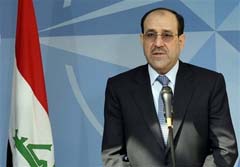Iraqi Prime Minister Nouri al-Maliki has urged Mujahedin-e Khalq organization to immediately leave the country, saying Baghdad had no place for the MKO.
The Iraqi government and parliament have a resolve to expel members of the notorious group after they committed crimes against the Iraqi people, exercised terrorism, cooperated with the Bathists and interfered in domestic affairs, said a statement by al-Maliki’s office.
after they committed crimes against the Iraqi people, exercised terrorism, cooperated with the Bathists and interfered in domestic affairs, said a statement by al-Maliki’s office.
The statement added that Iraq would not allow the MKO members to stay permanently in the residents of the group’s training camp in eastern Iraq, known as Camp Ashraf.
The statement came after a meeting held between al-Maliki and the new President of the International Red Cross mission in Iraq McKenna Bart.
Some 3,500 MKO members are held in a camp under the control of the Iraqi security forces.
The MKO is the most hated grouplet among both the Iranian and the Iraqi nations, and suffers from total unpopularity in these two countries.
The Mujahedin Khalq Organization, which blended elements of Marxism and Stalinism, was founded in Iran in the 1960s but was exiled some twenty years later over terrorism.
The group masterminded a torrent of terrorist operations inside Iran, one of which was the 1981 bombing of the offices of the Islamic Republic Party, in which more than 72 Iranian officials were killed.
A 2007 German intelligence report from the Federal Office for the Protection of the Constitution has identified the MKO as a "repressive, sect-like and Stalinist authoritarian organization which centers around the personality cult of [MKO leaders] Maryam and Masoud Rajavi".
The Iraqi premier touched upon mass graves contained Kuwaiti nationals who had fallen victim to the Ba’ath regime’s seven month-long invasion of Kuwait and said, "The issue of missing Kuwaitis is a humanitarian and not political case."
He expressed Iraq’s full readiness to "cooperate with our brothers in Kuwait."
He said that Iraq remains committed to cooperation on missing Kuwaiti property and money in letters previously sent to the United Nations and the Kuwaiti government aimed at putting an end to this humanitarian issue.
A mass grave, discovered in the headquarters of the MKO in Iraq in August, cast light on the crimes the terrorists committed during the 1991 Persian Gulf War.
If confirmed, the reports would expose MKO complicity in Saddam Hussein’s war on Kuwait, which killed more than 3,664 Iraqis and 1,000 Kuwaitis
MKO leaders are said to have kept the mass grave a secret so far by refusing the entry of Iraqi forces into their base.
The grisly discovery came at a time when scores of regional correspondents were granted a permit by the Iraqi government to prepare a report from Camp Ashraf, where MKO dissidents were stationed for more than two decades.

